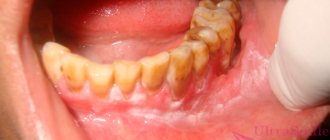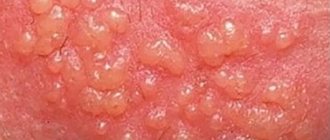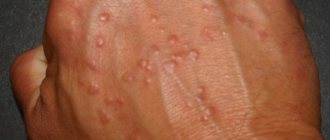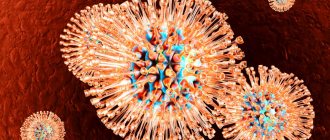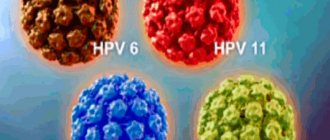Almost the entire population of the globe is infected with herpes simplex viruses types 1 and 2. Almost everyone is familiar with the first type - colds on the lips.
Infection occurs in early childhood. But for obvious reasons, it is not customary to talk about herpes simplex virus type 2 - genital.
However, this infection is far from unique, and how people become infected with herpes that affects the genitals is of interest to a large number of people. According to WHO statistics, in 2016, almost 500 million people consulted doctors with problems caused by herpetic eruptions in the external genital area.
Treatment of genital herpesvirus is more effective under the supervision of a specialist
The most popular questions on the network that relate to this topic will be answered by a venereologist of the highest category, head of the skin and venereal disease clinic, Viktor Ivanovich Likhodeev (pictured above).
Why is genital herpes dangerous during pregnancy?
Answer:
The answer to this question could be a topic for a separate article. It is believed that herpes infection can be the cause of non-developing pregnancy in 20 percent, secondary infertility in 60 percent, and miscarriage in 20 percent of cases.
In addition, the herpes simplex virus can be transmitted vertically - from mother to child, and the likelihood of transmission increases sharply if there are rashes on the mother's genitals during childbirth. With such an infection, the virus can “doze off” for a long time in the child’s body, or can cause herpes of the newborn, isolated as a separate form of infection. This disease can affect a variety of organs of the child, often leading to developmental disorders and sometimes death. Therefore, it is extremely important for expectant mothers to be examined for herpes infection and, if necessary, undergo a course of treatment to prevent exacerbations.
Herpes viruses: what you need to know about them and whether you can protect yourself from infection
Briefly: 70 to 90% of the population is infected with herpes viruses. Only children under 3-5 years of age are healthy, due to rare contacts with adults; as soon as the child begins to attend kindergarten or school, he becomes infected within a short period.
Are herpes viruses dangerous: for healthy people they do not pose a particular threat, a person outside of exacerbations is not contagious, isolation is required only during exacerbations. They become dangerous for people at risk.
Examination of a child with frequent colds
If a child has frequent, severe colds and acute respiratory viral infections, our center will find out the cause of this condition
Is there a treatment: there is no specific treatment today, so do not believe promises to cure herpes. A vaccine is currently being developed that should help fight herpes. Research is underway in the field of gene therapy. And the existing vaccine “Vitogerpovac” only stimulates a specific reaction of antiviral immunity in general, enhancing the immune response, in particular the activity of lymphocytes.
In short: you can live happily ever after with the herpes virus. And now in more detail: how many herpes viruses exist, how they differ and who is at risk.
Question #1: Is it true that HSV type 1 is a common cold, and HSV type 2 is a genital cold?
Previously, it was believed that HSV 1 only causes colds on the lips and other mucous membranes, and HSV 2 is the culprit of rashes on the genitals. No, that's not true. Viruses of both types feel great on any mucous membrane. In other words: oral sexual activity during an exacerbation of herpes on the lips of one partner will lead to infection of the other.
Other herpes viruses
Type 3 virus causes chickenpox and shingles. Most often, at the first meeting in childhood, chickenpox occurs, and at an older age, with weakened immunity and other diseases, symptoms of herpes zoster appear. And, the more weakened the immune system, the more frequent and severe the relapses.
Type 4 Epstein-Barr virus causes infectious mononucleosis, most often transmitted through kissing. The peculiarity of this type of virus is that it prefers to live and reproduce in one cell. By making her “immortal,” he actually provokes oncological processes. Thus, the Epstein-Barr virus was discovered while studying Burkitt's lymphoma. Nasopharyngeal carcinoma is also closely related to herpetic exacerbations. Don’t kiss your children on the lips; that’s what their cheeks, foreheads, hands are for, and in extreme cases, their heels.
Virus type 5 or cytomegalovirus . Its maximum concentration is in urine and saliva; children in kindergartens are often infected due to insufficient hygiene skills. Basically, it is a fairly peaceful type of herpes and the initial encounter goes away like a common cold and there are no further relapses. Dangerous only for weakened people, pregnant women and HIV-infected people. There is evidence that it may increase the risks of hypertension and atherosclerosis, type 1 diabetes.
Types 6, 7 and 8 of herpes viruses are poorly studied, most likely they are the culprits of chronic fatigue syndrome and unclear rash syndrome. It is known that herpes virus 6A is common in patients with multiple sclerosis.
Important : a person poses the greatest danger during primary infection; later, during periods of exacerbation, the risk of infection is much lower. However, in many people the disease manifests itself only once. And the larger the area of the rash, the worse the immune system works. There is another feature of herpes viruses - it only affects skin and epithelial cells. Typically, relapse occurs at the same site where the initial infection occurred.
Risk factors (or what triggers relapse):
- Temperature fluctuations and sudden climate changes are why herpes often appears in the off-season and after flights.
- Overheating and solar insolation (for people who are susceptible to frequent relapses, it is better not to sunbathe, avoid visiting baths and saunas
- Emotional stress (breakup, interview, exam)
- Physical overexertion (intense physical labor or sports)
- Local injuries, surgeries, skin damage
- Disturbances in the rhythms of life: lack of sleep, fasting or overeating, large amounts of alcohol on the menu.
Herpes is often triggered by menstruation, appearing either on the lips or like herpes zoster, but in the lower back and buttocks.
What is the danger of herpes viruses
Previously, it was believed that a herpetic rash was only an aesthetic defect, and a healthy person need not fear for his condition. Not at all. The herpes virus lives in nervous tissues; the connection between most chronic diseases of the nervous system and viruses has already been proven - Alzheimer's disease, multiple sclerosis and others. There is a close connection between liver damage and herpes viruses - the fact is that some viruses are imperfect and can only penetrate a cell that is already infected by another virus. That is, at the time of relapse of herpes, a person is more susceptible to other viral infections. It has already been proven that the herpes virus is often to blame for infertility of couples - it affects sperm, although both the man and the woman are reproductively healthy - pregnancy does not occur.
The main danger of herpes viruses: they activate and increase the likelihood of infection with other viruses, which in turn reactivate herpes, starting the process of constant relapses. In particular, such a relationship has been confirmed between the herpes viruses and HIV. This phenomenon is called epidemiological synergism, that is, herpes practically opens the gates to other viruses.
That is, even groups of relatively healthy people who do not have frequent relapses cannot be safe. Today, a connection has been identified between the presence of herpetic complications and certain genes.
Who is at risk or who is more likely to experience relapses and severe herpetic complications:
- Patients with primary and secondary immunodeficiencies (for many of them, herpes infection can become fatal, becoming generalized).
- Pregnant women (firstly, the woman herself is more susceptible to infection, and any illness during pregnancy is less tolerated, and secondly, there is a risk of herpetic damage to the fetus and congenital anomalies).
- Premature babies, newborns with developmental defects or low birth weight
- Patients receiving chemotherapy, taking drugs for the treatment of autoimmune and oncological diseases, antibiotics.
- Patients with bacterial pneumonia.
- Donors immediately after donation, people after blood loss and immediately after transfusion of blood and/or its components.
- Persons who have frequent promiscuous sex life (lack of a condom, low degree of its protection against herpes, if the virus affects the skin, the high contagiousness of the virus contributes to its rapid spread)
- People with tuberculosis, atopy, connective tissue diseases.
- Patients after surgical interventions - often herpes worsens even after cosmetic and dental procedures, since the nerve cells in which herpes lives are injured.
- Patients after organ transplantation.
- People over 65 years of age.
- People of certain professions: laboratory assistants, virologists, astronauts, miners, radiologists, dentists, pilots, coal industry workers, etc.
Symptoms and treatment
Symptoms of exacerbation can manifest themselves in different ways: from completely insignificant (when there is only a single element) to complicated - with a rise in temperature to high numbers, symptoms of intoxication. It is important which herpes virus caused the disease or complication. Now we are talking about the classical forms of HSV 1 and HSV 2.
You need to understand that regardless of the symptoms, at this moment you are very contagious and elderly people, patients with immunodeficiencies who happen to be nearby can receive their dose of the virus. At the same time, if you or your loved ones are at risk, then it is better to protect yourself and wear sterile masks.
- During an exacerbation, avoid cosmetics and creams - along with them, you “smear” the virus over the skin and mucous membranes.
- Do not touch your eyes and other mucous membranes - this will lead to infection (be sure to wash your hands before using the toilet, eyes and genitals).
- Change towels, or better yet, use disposable ones.
- Drink only from your own glassware, wash it separately or in the dishwasher
- Do not peel off the crusts or burst the bubbles.
- Use products for external use - they soften the skin well and promote rapid healing.
If there are symptoms of intoxication, high fever, herpetic rashes, call a doctor at home.
How to test yourself for herpes viruses
If you are over 18, you are most likely already infected. You can get tested for antibodies, do PCR diagnostics, an increase in immunoglobulins, of course, is also an indicator - but they increase in response to almost any infection.
What should I do if I am infected?
We said above that if you are over 18, then most likely you are infected. The main thing is not to fall into risk groups, avoid provoking factors, and lead a healthy lifestyle. You can make an appointment with an immunologist and check the risks of cancer and other pathologies for which a gene-disease relationship has already been identified, and follow the news to be the first to know when a cure for herpes is found.
You can undergo such diagnostic examinations at our center named after. Speransky. Our doctors adhere to the rule: the main thing is to preserve the health and natural strength of the body, and not to heal the patient until, according to tests, everything is perfect.
What and how is genital herpes treated?
Answer:
Treatment of this infection, like other diseases, should begin with a consultation with a doctor - only a specialist can make the correct diagnosis, assess the condition of a particular patient and choose treatment, taking into account contraindications and side effects of medications.
In recent years, therapy for infections of the reproductive system is almost impossible without the prescription of drugs that increase the body’s own defenses, that is, stimulate the immune system.
The most studied and well-proven immunostimulant in clinical practice is the original domestic drug Cycloferon . Its active ingredient is methylglucamine acridone acetate (a soluble synthetic analogue of the alkaloid of the Citrus grandis
) – stimulates the body’s production of its own interferons, thereby enhancing the nonspecific immune response and reducing the susceptibility of cells to the virus.
In the treatment of genital herpes, the best effect is achieved by combining the use of Cycloferon tablets orally and applying Cycloferon liniment (liquid ointment) locally to the area of the rash. In addition to methylglucamine acridone acetate, liniment contains the antiseptic benzalkonium, which prevents the complication of herpes by a secondary purulent bacterial infection.
The decision to prescribe Cycloferon should be made by a doctor
, however, the lack of toxicity and allergenicity allows you to use the prescribed drug independently. Since Cycloferon is compatible with all medications, it can be used as part of complex therapy.
Causes of herpes
Herpes simplex virus type 1 (HSV-1) can be transmitted through household contact. Airborne transmission is also possible.
The airborne route is the main route of infection with the varicella zoster virus.
Genital herpes and cytomegalovirus are transmitted sexually.
You can also become infected with herpes through blood or saliva. The virus can be transmitted through saliva through kissing. Small children who put things in their mouths every now and then are also very vulnerable. If at least one child in a children's group is infected, a rapid spread of the infection can be expected.
Infectious mononucleosis
This sore throat-like disease, which is caused by human herpesvirus type 4 or Epstein-Barr, is transmitted by airborne droplets, most often through saliva. This herpes is transmitted through a kiss, which is why infectious mononucleosis is called the “kissing disease.”
Is it possible to kiss with herpes (type 4)? If your throat hurts, then it’s better not to
Despite the fact that about 40% become infected with the Epstein-Bar virus in kindergarten and primary school, the clinical picture of the disease: damage to the pharynx, an increase in the size of the lymph nodes, liver and spleen, manifests itself in adolescence and junior age. The vast majority of people by the age of 35 have strong immunity to this herpesvirus, and relapses of the disease are possible only in those infected with HIV.
Infectiousness of humans during the incubation period and after illness
The incubation period for infection in an adult is up to 14 days, meaning symptoms of the infection will appear 1-2 weeks after infection. In children infected in early childhood, the first outbreaks of herpes occur by 3-4 years. How long the incubation will last depends on the state of the immune system - the stronger the immune system, the longer.
A virion (viral particle), penetrating a healthy cell of the human body, is fixed in the nucleus. After adaptation, the virus begins to closely interact with the immune system, which allows it to persist in the body throughout life. During incubation, the sick person becomes contagious almost from the first days and can accidentally infect loved ones through kisses, since he does not even suspect that he is sick.
Herpes becomes most dangerous in the acute stage, when a rash appears on the body. Viral diseases of the lips are mainly transmitted through kissing. It is very easy to get herpes through a kiss. The rash is caused by type 1 of the virus.
After the active stage, the carrier of the virus remains dangerous to others for a month. In the passive stage, herpes is also dangerous; it can be transmitted through kissing and more, but the likelihood of transmitting the disease is less.
Why does herpes appear after kissing and what to do about it
The answer to the question of whether you can get herpes from a kiss is already clear. Not everyone develops an infection after infection. The likelihood of symptoms of a viral disease appearing after a kiss depends on the state of the immune system.
The disease progresses only in a weakened body. A healthy immune system can contain the virus with the help of antibodies, which it produces in response to pathogenic particles entering the body. Relapses are also provoked by the weakness of the protective system. The following can reduce immunity:
- other various chronic infections;
- bad habits (smoking, alcohol, drugs, unhealthy food);
- hidden infections (HIV, hepatitis, early tuberculosis);
- vitamin deficiency due to diets or diseases;
- hormonal imbalances (during pregnancy, age-related, pathological);
- oncological diseases;
- stress, lack of sleep, overwork.
If, after a kiss, an itchy rash in the form of blisters appears on the lips or in other places, you should immediately go to the hospital, get examined and treat the problem. For treatment, antiviral medications based on acyclovir, valacyclovir, famciclovir are used, as well as immune stimulants, vitamins, anti-inflammatory and antihistamines. The rash can be smeared with combination drugs: Bonafton, Viru-merz serol, Panavir, Tebrofen ointment, Depanthenol, Hyporamine, Alpizarin ointment.
How to protect yourself from illness
To avoid catching herpes from kissing, you just need to avoid close contact with sick people who have obvious signs of this disease. Additionally, it is recommended to follow other rules for preventing infection:
- do not use other people’s things (dishes, cosmetics, linen, clothes);
- do not give your things to strangers;
- do not touch the body, especially the face, with dirty hands;
- avoid unprotected and casual sex;
- strengthen immunity;
- use antiseptics after public toilets.
Don't be afraid of herpes. Almost the entire population of the planet is infected with the infection, so it can only be avoided if you completely protect yourself from the outside world. It’s better to simply strengthen your immune system - this is the most reliable protection against frequent relapses and complications.



